
The rotator cuff is a group of four muscles in the shoulder that form a cuff of tissue around the humeral head in the shoulder joint. These muscles provide strength to the shoulder and function to lift the arm. Tears in the tendons of any of these muscles are called rotator cuff tears.
Causes of Rotator Cuff Tears
There are three causes of rotator cuff tears: trauma, extrinsic compression, and intrinsic degeneration. As one gets older, the quality of our tendons and the blood supply to the tendons diminishes, making the tendons susceptible to tearing, which is known as intrinsic degeneration. The extrinsic compression is a combination of anatomy and lifetime wear and tear. As one elevates the arm, the acromion bone rubs the rotator cuff causing wear of the muscles. With years of repeated rubbing, the muscle and its tendon eventually tear. It should be noted that while there is a considerable number of people in the elderly community with torn rotator cuffs, the majority of these people show no symptoms. The most common symptoms are lack of mobility, weakness, and pain in the shoulder, especially with overhead movements. The pain is usually described as dull at rest, exacerbated by overhead movements, and severe at night. In essence, the larger the tear, the poorer the function.
How To Diagnose Rotator Cuff Tears
In order to properly diagnose these injuries, a physician will perform orthopedic tests as well as diagnostic imaging such as X-ray, MRI and/or ultrasound. The initial treatments for rotator cuff tears are usually conservative, as long as the tear is not severe. These treatments include: rest, anti-inflammatory medications, steroid injections or physical therapy. Corticosteroid injections are administered in the shoulder joint to relieve pain and decrease inflammation. While such shots are often temporarily helpful, they should be used carefully, as they can contribute to a weakening of the tendon and may lower the success of surgery if this is eventually needed. Physical therapy will restore your range of motion, muscle strength, and coordination so that you can return to your regular activities. In some cases, you may learn to modify your physical activity so that you put less stress on your shoulder.
Surgery is recommended if conservative treatment fails or if there is a severe tear (more than 3mm). Surgery is also recommended in most tears that occur as a result of trauma. There are a few options for repairing rotator cuff tears, including less invasive procedures.
The type of repair performed depends on several factors such as the size of your tear, your anatomy, and the quality of the tendon tissue and bone. The most commonly used techniques for rotator cuff repair include arthroscopic repair, open tendon repair, and tendon transfer. With an arthroscopy repair procedure, the surgeon inserts a camera and instruments through a small incision to reattach the torn tendon to the bone. If the tear is large and complex, the surgeon may make an incision over the shoulder and detaches one of the shoulder muscles to better see and gain access to the torn tendon. When the torn tendon is extremely damaged the surgeon will use a nearby tendon as a replacement.
The timeline for your recovery will vary depending on the surgical procedure and your general state of health, but return to sports, heavy lifting, and other strenuous activities might not begin until four months post-surgery, and full return may not occur between nine to twelve months after surgery. Rehabilitation plays a vital role in getting you back to your daily activities. A physical therapy program will help you regain shoulder strength and motion. There are three phases of recovery: immobilization, passive exercises and active exercises. Each and every phase is important to recover and return to any activity, sport or occupation. Don’t forget to seek professional from Atlas Total Health Chiropractic for help if you had a trauma in the shoulder or if you have any symptom associated with rotator cuff tear since it can deteriorate over time and may require surgery when maybe was not necessary at the first place. Contact us at (866) 668-0108.
References:

